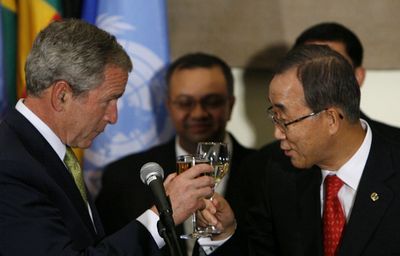Bush tells world leaders he’s focused on markets
President makes final visit to U.N.

UNITED NATIONS – World leaders heard assurances from President Bush on Tuesday that he is acting swiftly to contain America’s financial upheaval, but allies and critics alike called for a collective effort to rewrite the rules governing global capital markets.
In a speech to the U.N. General Assembly, Bush acknowledged that the turmoil could wreck other nations’ economies. He said his administration was working with Congress on a $700 billion bailout while taking other “bold steps” to stabilize markets and credit flows.
“I am confident we will act in the urgent time frame required,” Bush said.
Although he did not ask for action by other countries, several speakers at the General Assembly’s annual fall debate insisted that a new multilateral forum overhaul the global financial system.
French President Nicholas Sarkozy proposed that the Group of 8 take up the task at a special summit in November, with the added presence of China and other developing nations.
“No country, however powerful it may be, can bring an effective answer to the financial crisis on its own,” Sarkozy said.
Bush was making the final U.N. appearance of a presidency marked by testy relations with the world body, notably over his decision to go to war in Iraq without a Security Council resolution.
His low-key speech Tuesday repeated old themes, including an appeal for firmer action against terrorism, which he called “the fundamental challenge of our time.”
The words terror, terrorist or terrorism came up 32 times in his 22-minute address, which drew a few seconds of polite applause in the giant assembly hall.
Alarm over the financial meltdown dominated the 28 other speeches Tuesday, making Bush sound out of sync.
“He opted to talk again about terrorism,” Brazilian President Luiz Inacio Lula da Silva told reporters. “The economic crisis … is the most important thing at this moment.”
Lula and other leaders from developing nations demanded a stronger voice in decisions in shaping the world economy. They described the pain of sharp food and fuel price increases.
“Economic uncertainty has moved like a terrible tsunami around the globe, wiping away gains, erasing progress,” said Philippines President Gloria Macapagal Arroyo. “Just when we thought the worst had passed, the light at the end of the tunnel became an oncoming train, hurtling forward with new shocks to the global financial system.”
U.N. Secretary-General Ban Ki-moon opened the gathering with a grim portrayal of a world facing multiple economic shocks as well as outbreaks of armed conflict and a “new rhetoric of confrontation.”
“I see a danger of nations looking more inward, rather than toward a shared future,” he said. “If ever there were a call to collective action, a call for global leadership, it is now.”
Tuesday’s debate strayed at times into political theater.
As Bush denounced Iran as a sponsor of terrorism, Iranian President Mahmoud Ahmadinejad smiled and waved to people in the galleries. At one point he turned to an aide, raised a fist and flashed a thumbs-down.